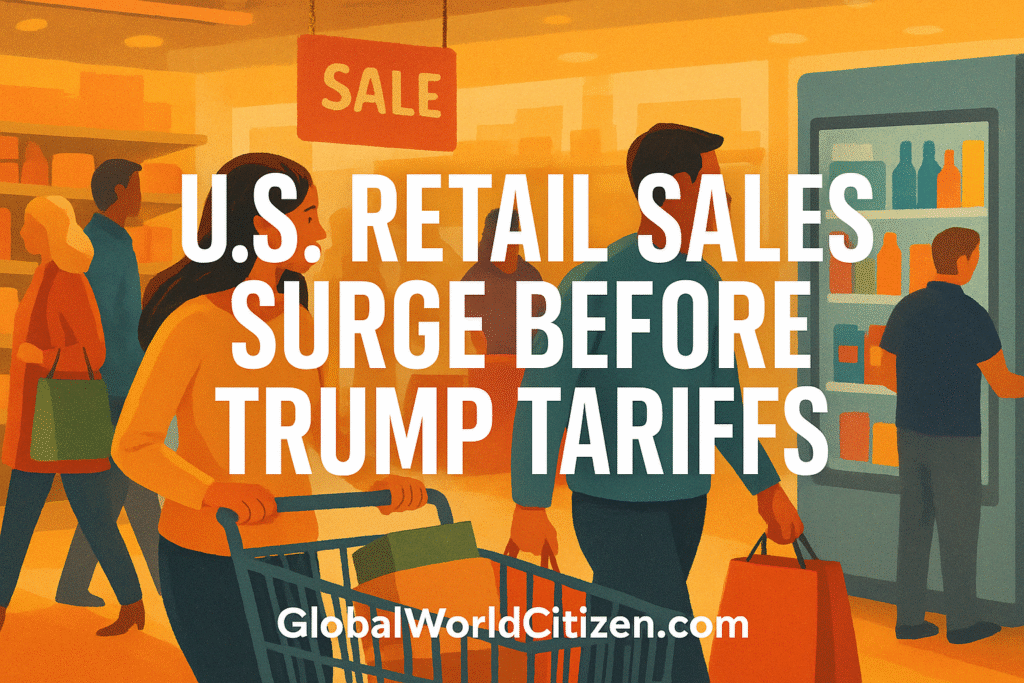Published: April 16, 2025 ✍️ By: Global Economy & Consumer Intelligence Desk 🌐 Source: GlobalWorldCitizen.com
 American Retail Sales Jump 4.6% in March 2025 as Tariff Fears Accelerate Consumer Spending
American Retail Sales Jump 4.6% in March 2025 as Tariff Fears Accelerate Consumer Spending
In a surprising show of economic resilience, U.S. retail and food service sales rose 4.6% in March, according to the latest U.S. Census Bureau data. This marks a 4.1% year-over-year increase and comes just as the Trump administration’s “Liberation Day” tariff policies begin to reshape the consumer landscape.
As inflation fears and trade uncertainty grow, American consumers appear to be shopping strategically—spending ahead of expected price hikes tied to incoming tariff adjustments.
 March 2025 Retail Report: Key Takeaways
March 2025 Retail Report: Key Takeaways
Despite growing economic pressure, nearly all retail sectors recorded growth, with only two exceptions:
Gas stations: Down 4.3% due to falling energy prices
Department stores: Down 2.5% year-over-year
Top-performing categories included:
Auto dealers: +9.2% as buyers rush to lock in pre-tariff vehicle prices
Furniture & home goods: +7.7% increase
Apparel & accessories: +5.4% growth
Bars & restaurants: +4.8% — a signal of continued discretionary spending despite uncertainty
These numbers reflect not only a preemptive consumer response to tariffs, but also holiday-driven boosts as Easter-related purchases surged across demographics.
 Tariff Fears vs. Consumer Optimism: What’s Driving the Spend?
Tariff Fears vs. Consumer Optimism: What’s Driving the Spend?
While consumer confidence levels have dropped 30% since December 2024, spending remains robust. Analysts cite several contributing factors:
“Solid wage growth, lower fuel costs, and generous tax refunds have created short-term momentum,”
— Jack Kleinhenz, Chief Economist, National Retail Federation (NRF)
However, Kleinhenz also attributes the uptick to consumer urgency fueled by tariff announcements—especially those targeting electronics, fashion, and automotive sectors.
 Trump’s Trade Policy & Tariff Uncertainty Reshape Consumer Behavior
Trump’s Trade Policy & Tariff Uncertainty Reshape Consumer Behavior
As the Trump administration’s trade agenda sends mixed signals—ranging from 145% tariff threats to temporary exemptions—consumers appear to be front-loading purchases.
“Tariffs and stock market turmoil are increasing concerns, but Americans are responding by spending strategically,”
— Jack Kleinhenz, NRF
At the heart of this trend is the intersection of economic nationalism and retail behavior—a global pattern where policy decisions directly influence short-term market action.
 Not Just Tariffs: Lifestyle Spending Still Strong
Not Just Tariffs: Lifestyle Spending Still Strong
Not all experts agree that tariffs are the primary driver. Some see the rise in restaurant and leisure spending as a sign of underlying consumer optimism:
“The 4.8% growth in restaurant sales points to the power of lifestyle experiences—even in economic uncertainty,”
— Ted Rossman, Senior Analyst, Bankrate
 Easter 2025 Spending Hits Record Highs
Easter 2025 Spending Hits Record Highs
March’s surge also aligns with Easter-related consumer activity:
Total expected Easter spending: $23.6 billion (up 5% from 2024)
Over 54% of non-celebrants also plan to shop
Non-celebrants alone will contribute nearly $800 million to the retail economy
“In times of uncertainty, celebrations become more meaningful,”
— Katherine Cullen, VP of Industry & Consumer Insights, NRF
 GlobalWorldCitizen.com Insight: The Retail Ripple of Economic Nationalism
GlobalWorldCitizen.com Insight: The Retail Ripple of Economic Nationalism
At GlobalWorldCitizen.com, we see this as more than a U.S. retail trend—it’s a reflection of how global economic policy shifts affect daily consumer behavior.
Key Global Insights:
Pre-tariff spending surges show how quickly policy impacts purchasing
Economic uncertainty fuels strategic consumer planning worldwide
Emotional and cultural spending patterns remain resilient—even in volatility
This moment highlights the complex relationship between national policy, global markets, and everyday decisions made by global citizens.
 Final Word from GlobalWorldCitizen.com
Final Word from GlobalWorldCitizen.com
American consumers are sending a message: despite political uncertainty and economic turbulence, spending remains a powerful expression of resilience, optimism, and strategy.
As global economies recalibrate around trade wars, tariffs, and nationalism, the actions of everyday citizens—what they buy, why they buy, and when they buy it—continue to shape the global economy in real time.

Global consumer trends & economic insights
Retail supply chain disruptions
Tariff impact analysis
Real-time reactions from across industries and nations

